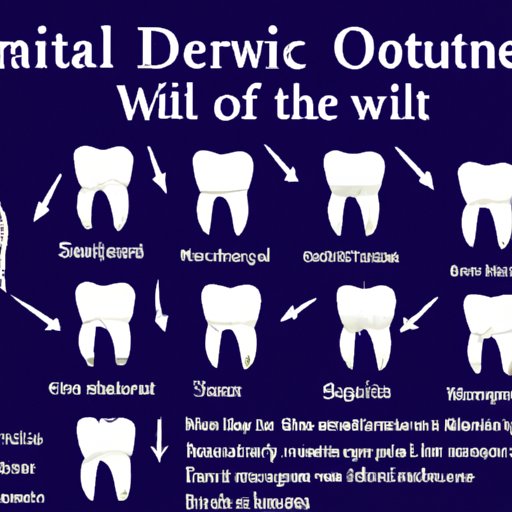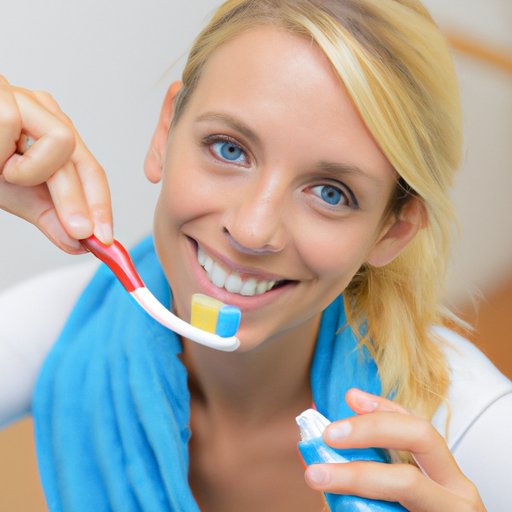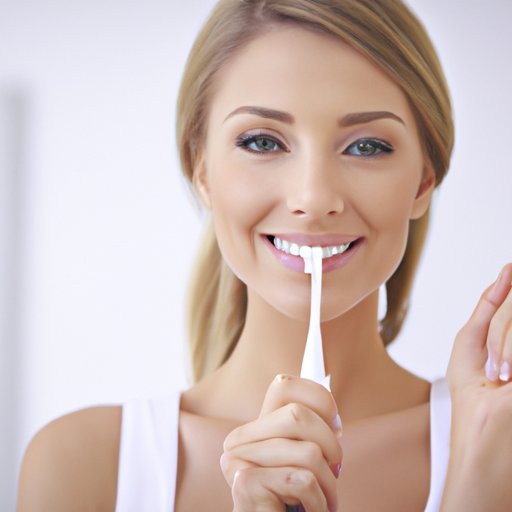Introduction
Brushing your teeth is one of the most important aspects of oral hygiene. Proper brushing helps to remove plaque, which can cause cavities, gum disease, and other issues. But how long should you brush your teeth for? In this article, we’ll explore the answer to that question and provide a comprehensive guide to optimal dental hygiene.

A Guide to Optimal Tooth Care
The importance of timing when it comes to brushing your teeth cannot be overstated. It’s recommended that you brush your teeth twice a day – once in the morning and once before bed – for two minutes each time. Additionally, it’s important to use the right toothbrush and toothpaste. Choose a soft-bristled toothbrush and fluoride toothpaste for optimal results.
So, how long should you brush your teeth for? Generally speaking, you should brush your teeth for two minutes at a time. This may seem like a long time, but it’s important to take your time and make sure you cover all surfaces of your teeth. Start by brushing the outer surfaces of your upper and lower teeth, then move on to the inner surfaces and finish by brushing the chewing surfaces. Use short, gentle strokes and focus on one area at a time. After two minutes, you’re done!
Your Oral Health Depends on It
When it comes to oral hygiene, it’s important to understand the types of plaque that can build up on your teeth. Plaque is a sticky film of bacteria that forms on the surface of your teeth. If it’s not removed, it can harden into tartar, which can lead to cavities and gum disease. Therefore, it’s important to brush your teeth regularly to prevent plaque buildup.
To keep your teeth healthy, it’s important to stick to a regular dental hygiene routine. This includes brushing your teeth twice a day for two minutes each time, flossing daily, and using mouthwash. Additionally, it’s important to visit the dentist for regular checkups and cleanings.
If you don’t follow a good dental hygiene routine, it can have serious consequences for your oral health. Poor oral hygiene can lead to cavities, gum disease, bad breath, and other issues. Therefore, it’s important to take the time to brush your teeth properly.

Get the Most Out of Your Toothbrush
In order to get the most out of your toothbrush, it’s important to use proper brushing techniques. Start by wetting your toothbrush with warm water. Squeeze a pea-sized amount of toothpaste onto the bristles and spread it around. Place the toothbrush at a 45-degree angle against your gums and use short, gentle strokes to brush the outer surfaces of your upper and lower teeth. Move the brush in small circles, making sure to cover all surfaces of the teeth. Then, move on to the inner surfaces and finish by brushing the chewing surfaces.
It’s also important to brush your teeth at the right frequency. You should brush your teeth twice a day, once in the morning and once before bed. Additionally, you should brush your teeth after meals if possible. Lastly, it’s important to pay attention to the duration of your brushing. As mentioned above, you should brush your teeth for two minutes at a time.

The Top Tips for Maintaining Healthy Teeth
In addition to brushing your teeth twice a day, there are a few other things you can do to maintain healthy teeth. Flossing is important for removing plaque from between your teeth, as well as preventing gum disease. Mouthwashes can help to kill bacteria and reduce plaque buildup. Lastly, it’s important to visit the dentist for regular checkups and cleanings.
An Expert’s Guide to Brushing Your Teeth
For more advice on brushing your teeth, it’s always a good idea to consult with a professional. Dentists, orthodontists, and dental hygienists can provide valuable tips and information on proper brushing techniques. Here are a few pieces of advice from each type of expert:
Dentist: A dentist will likely recommend using a soft-bristled toothbrush and a fluoride toothpaste. They may also advise against using too much toothpaste, as this can lead to enamel erosion and other issues.
Orthodontist: An orthodontist may recommend using an electric toothbrush, as these can be more effective at removing plaque than a manual toothbrush. They may also suggest brushing in a circular motion to ensure that all surfaces of the teeth are cleaned.
Dental Hygienist: A dental hygienist may recommend brushing for two minutes at a time, focusing on one area of the mouth at a time. They may also suggest using a timer to ensure that you’re brushing for the full two minutes.
A Comprehensive Look at Dental Hygiene
In addition to brushing your teeth, there are several other aspects of dental hygiene that you should be aware of. Regular cleanings are important for removing plaque and tartar buildup. Eating a balanced diet and getting enough nutrients can also help to keep your teeth and gums healthy. Finally, managing stress can help to keep your mouth free of bacteria.
Conclusion
Brushing your teeth is essential for maintaining good oral health. To get the most out of your toothbrush, it’s important to brush your teeth twice a day for two minutes each time, using the right toothbrush and toothpaste. Additionally, it’s important to floss daily, use mouthwash, and visit the dentist for regular checkups and cleanings. With these tips, you can ensure that your teeth stay healthy and strong for years to come.
(Note: Is this article not meeting your expectations? Do you have knowledge or insights to share? Unlock new opportunities and expand your reach by joining our authors team. Click Registration to join us and share your expertise with our readers.)
